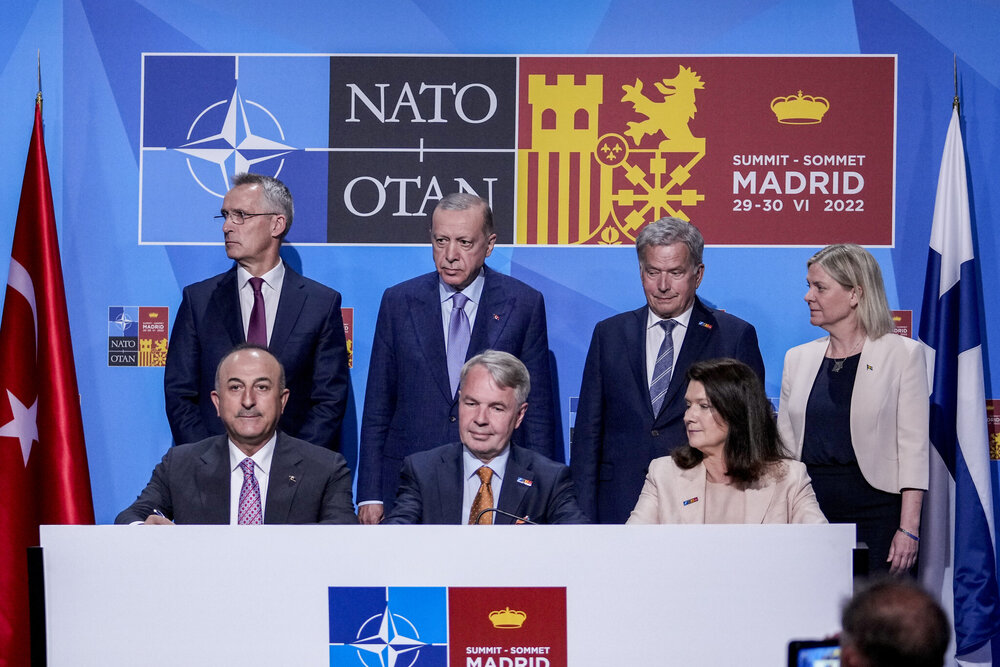Ankara following a balanced policy towards the Ukrainian war: Turkish researcher

TEHRAN - Gloria Shkurti Ozdemir, a Turkish researcher at SETA Foundation, tells the Tehran Times that Ankara “is trying to follow a balanced policy towards the Ukrainian war.”
She says in several cases Turkey has tried to mediate between Russia and Ukraine.
On June 29, Turkey agreed to support Sweden and Finland's membership of NATO. It had initially opposed the Nordic countries' bids to join. Turkey was angered by what it saw as willingness by Sweden and Finland to host Kurdish rebels. Sweden and Finland could not join the military alliance without Turkey's support.
By agreeing to accept requests by these two Nordic states to join the alliance, Ozdemir says, NATO proved that it is “serious in protecting its borders and allies”.
She adds, “From NATO’s perspective, this open the way to a new enlargement of NATO which is totally contrary to what Russia was expecting.”
Following is the text of the interview:
Q: Turkey agreed to lift opposition to Sweden and Finland joining NATO. How do you see such a move?
A: The meeting that took place last week and its results are of greatest importance, not only for Turkey but for the Western block in general. At a time when the West is considered to be highly divided the memorandum that was signed showed that NATO is still unified. At the same time, Turkey showed that it is interested in solving the existing issues through dialogue, diplomacy, and peace.
Unlike some critical voices that Turkey is using the situation, I think that Ankara did what each country would do to protect its national interest. Turkey was not opposed to Sweden and Finland's NATO membership, Ankara only wanted these two states to stop their support of the terrorist groups that posed a threat to its security.
Within this framework, Turkey’s move to allow these two states to be invited (the first step of membership) - not to become full members- in NATO is quite significant for the future of NATO and Turkey’s security as well.
Q: What are the implications of Ankara's decision to accept Sweden and Finland as new members of NATO?
A: Here it is important to state that Sweden and Finland are still not members of NATO. The invitation to discuss their inclusion in NATO is still only the first step. If we were to respond to the question from Turkey’s perspective, it can be said that if Sweden and Finland proceed with what they signed on the memorandum, this is a great victory for Turkey. For such a long time, Turkey has been arguing that PKK, its branches (YPG/PYD), and FETO pose a direct threat to its security (also to European security). However, the West has been ignoring these voices for a long time, leading to divergences with Turkey. This memorandum may be the first step toward a change in the Western stance toward these terrorist organizations. If this stands true, Turkey’s relations with the west may improve in the future.
From NATO’s perspective, this open the way to a new enlargement of NATO which is totally contrary to what Russia was expecting. For a long time, the unity or even the effectiveness of NATO had been questioned (especially after the Cold War), however, these developments once again brought to the fore the importance of NATO. If these two states are accepted by NATO, the latter will share a border with Russia which will show Russia that NATO is indeed serious about protecting its borders and allies.
Q: How do you see Turkey-Europe ties? Is Ankara still trying to be a member of the EU?
A: It would be quite complicated to analyze in general Turkey-Europe ties as there are several dynamics defining the relationship with each state separately. However, as Turkey’s importance increases in regional dynamics, it can be said that these relationships will generally be impacted positively. The European states are well aware of Turkey’s importance in the current political environment, and it would not serve well for either party to follow policies that would negatively impact the relations.
Whether Ankara is still trying to become a member of the EU, I can say that Turkey has never closed that door. It has always been one of the goals of the Turkish government and it still remains so.
Q: What is the position of Turkey in the Ukraine war? Apparently, Turkey's drones are used by Ukraine’s forces.
A: Turkey is trying to follow a balanced policy towards the Ukrainian war. In many cases, the government has stated that both states are Turkey’s allies. Within this context, Ankara believes that through a balanced policy it is possible to find a solution to the crisis, therefore in several cases, it has tried to mediate between both states. Turkey has indeed opposed the Russian invasion of Ukraine and since the beginning, it has stated its support for the Ukrainian government and the Ukrainian territorial integrity.
Q: Isn't that a contradiction that an Islamic country like Turkey serve a Western alliance like NATO that can harm Islamic nations?
A: Not at all. First of all, rather than calling it an Islamic country, it would be better to state that Turkey is a Muslim majority country.
Secondly, NATO is not a threat to the Islamic states or the Muslim majority states. Several other Muslim majority states are members of NATO as well. It is important to remind here that NATO was created to counter the Soviet threat during the Cold War. Even currently, Russia remains one of the main threats to NATO (in the last strategic concept, China was added as a threat as well). So, to be frank, I do not see a contradiction there at all.
Leave a Comment